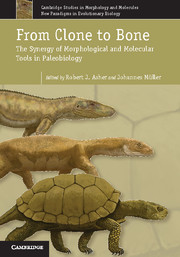Book contents
- Frontmatter
- Contents
- Contributors
- 1 Molecular tools in palaeobiology: divergence and mechanisms
- PART I Divergence
- 2 Genomics and the lost world: palaeontological insights into genome evolution
- 3 Rocking clocks and clocking rocks: a critical look at divergence time estimation in mammals
- 4 Morphological largess: can morphology offer more and be modelled as a stochastic evolutionary process?
- 5 Species selection in the molecular age
- PART II Mechanisms
- 6 Reconstructing the molecular underpinnings of morphological diversification: a case study of the Triassic fish Saurichthys
- 7 A molecular guide to regulation of morphological pattern in the vertebrate dentition and the evolution of dental development
- 8 Molecular biology of the mammalian dentary: insights into how complex skeletal elements can be shaped during development and evolution
- 9 Flexibility and constraint: patterning the axial skeleton in mammals
- 10 Molecular determinants of marsupial limb integration and constraint
- 11 A developmental basis for innovative evolution of the turtle shell
- 12 A molecular–morphological study of a peculiar limb morphology: the development and evolution of the mole's ‘thumb’
- 13 Manus horribilis: the chicken wing skeleton
- Index
- Plate-section
- References
13 - Manus horribilis: the chicken wing skeleton
Published online by Cambridge University Press: 05 November 2012
- Frontmatter
- Contents
- Contributors
- 1 Molecular tools in palaeobiology: divergence and mechanisms
- PART I Divergence
- 2 Genomics and the lost world: palaeontological insights into genome evolution
- 3 Rocking clocks and clocking rocks: a critical look at divergence time estimation in mammals
- 4 Morphological largess: can morphology offer more and be modelled as a stochastic evolutionary process?
- 5 Species selection in the molecular age
- PART II Mechanisms
- 6 Reconstructing the molecular underpinnings of morphological diversification: a case study of the Triassic fish Saurichthys
- 7 A molecular guide to regulation of morphological pattern in the vertebrate dentition and the evolution of dental development
- 8 Molecular biology of the mammalian dentary: insights into how complex skeletal elements can be shaped during development and evolution
- 9 Flexibility and constraint: patterning the axial skeleton in mammals
- 10 Molecular determinants of marsupial limb integration and constraint
- 11 A developmental basis for innovative evolution of the turtle shell
- 12 A molecular–morphological study of a peculiar limb morphology: the development and evolution of the mole's ‘thumb’
- 13 Manus horribilis: the chicken wing skeleton
- Index
- Plate-section
- References
Summary
Introduction
Evolution is a natural experiment that has been running for millions of years (Shubin 1991). Developmental biologists and palaeontologists can learn from this experiment (Zákány and Duboule 2007; see also chapters in this volume by Anthwal and Tucker; Buchholtz; Kuratani and Nagashima; Mitgutsch et al.; Schmid; Sears et al.; Smith and Johanson). A particular challenge is the homology of elements distal to the ulna and radius in modern birds. Developmental biologists differ on how many skeletal primordia actually develop in the embryonic wing bud, and the homologies of the permanent bones of the avian wrist are also uncertain.
Study of the avian wing is important for several reasons. First, the wing skeleton is an important issue in discussions about avian origins (Ostrom 1975; Müller 1991; Feduccia 2002; Prum 2002; Vargas and Fallon 2005b; Feduccia et al. 2007). Furthermore, the chicken is a key model species in developmental biology, and the development of its wing has been intensively studied in the context of pattern formation theory (Tickle 2004). Finally, the fact that the avian wing is studied by developmental biologists, palaeontologists, morphologists and others makes it a suitable subject of enquiry for the integrated discipline of evo devo (Galis et al. 2003).
Information
- Type
- Chapter
- Information
- From Clone to BoneThe Synergy of Morphological and Molecular Tools in Palaeobiology, pp. 328 - 362Publisher: Cambridge University PressPrint publication year: 2012
References
Accessibility standard: Unknown
Why this information is here
This section outlines the accessibility features of this content - including support for screen readers, full keyboard navigation and high-contrast display options. This may not be relevant for you.Accessibility Information
- 5
- Cited by
